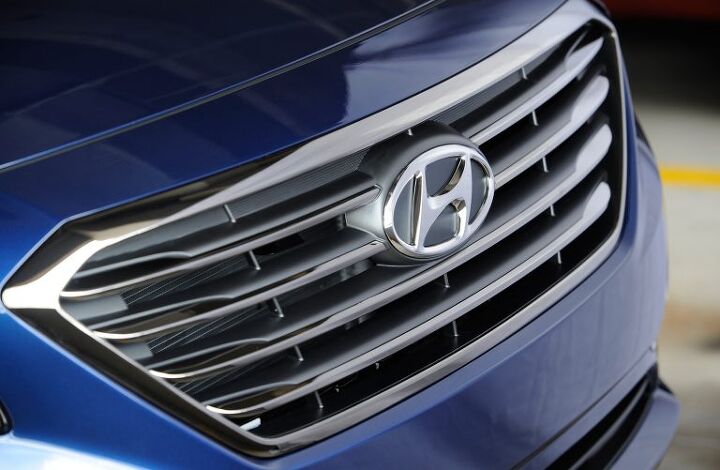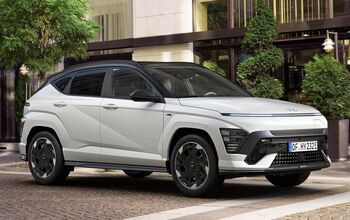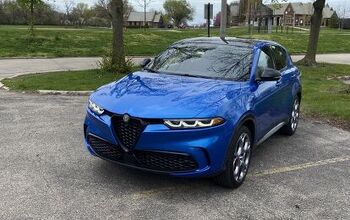Hyundai Secures New Chairman: Nepotism or Sagacity?

It’s often difficult to keep track of who is heading which automotive conglomerate. Topps never issued a trading card line devoted to industry professionals and there’s no show we’re aware of that catalogs the corporate history of car manufacturing focused entirely on management. Whenever someone is named in a car documentary, it’s only because they were incredibly important to the program or instrumental in seeing the company through a difficult period. That, or they happened to be one of those people’s damned children.
Nepotism is a problem in most industries but the automotive sector seems to be among the worst offenders. While some amount falls within the acceptable parameters rooted in the familial ties of yesteryear, when these businesses were much smaller entities, plenty of placements seem designed to keep wealthy offspring occupied through adulthood. It’s probably a sweet gig if you can get it but the phenomenon itself makes it difficult to determine which blood-related hires are placeholder people and who’s the genuine article.
For example, Hyundai Motor Group has just appointed Eui-Sun Chung (49) as its new chairman. He will be succeeding his father, Mong-Koo Chung (81), and comes from the automaker’s founding family. But there’s plenty of evidence to suggest Chung may actually be the ideal man for the job.
While that may be indicative of Chung having an elevator key that takes one far beyond the glass ceiling, the South Korean automotive conglomerate has also been killing it during his ascension. Hyundai’s U.S. market share has been moving in the right direction ever since Chung signed on with only a couple of years representing any negative growth. Sales in China were also healthy, with the company seeing explosive growth between 2008 and 2014 as Hyundai nearly doubled its market share in Europe.
Can we automatically assume Eui-Sun Chung was the deciding factor in that? Of course not. But we do know he was instrumental in pushing the budget-focused brand toward a more premium experience. While this may ultimately result in Korean products abandoning price-conscious shoppers, their existing lineup is loaded with winners that won’t break the bank. Chung is also said to have insisted upon the implementation of the Genesis brand, which seems to exist specifically to undercut German luxury vehicles in an effort to destroy them.
But that’s our assessment. Hyundai’s official announcement framed Chung as pioneering alternative energy strategies and deified him as a man of the people. While corporate releases are often frosted with important-sounding emptiness, this one overplayed its hand by spending too much time on mobility. Hyundai even made mention that the company was actively working on flying cars, forcing an involuntary eye roll.
From Hyundai Motor Group:
Over the years, Chung has stressed the customer-centric approach and customer satisfaction, and applied the concept more broadly to all of humanity.
“For the free movement and prosperity of humanity, we will develop the world’s most innovative and reliable autonomous driving technology, offering entirely new mobility experiences,” said the Chairman. Chung is spearheading the Group’s transformation from an automaker into a future mobility solution provider.
The Group will offer mobility solutions tailored to customer lifestyles and continue to grow its market leadership in various fields, including autonomous driving, electrification, hydrogen fuel cell, robotics and Urban Air Mobility (UAM).
Like most automotive firms, Hyundai has committed itself to electrification by promising to sell 1 million electric vehicles (globally) in 2025. This effectively forces it to make mention of its green dreams and the associated mobility crap informed shoppers couldn’t care less about. Bothersome but unlikely to be indicative of anything more than the company not wanting to issue any messaging that strays from the now beaten trail blazed by the likes of disposed Ford CEO Mark Fields years earlier. At the very least, Chung’s emphasis on tech should make sure Hyundai/Kia products remain competitive for the foreseeable future and won’t be left in the dust if EVs take over the planet.
The younger Chung begins his journey as group chairman today, with Mong-Koo Chung assuming an honorary chairman position that foreshadows his official retirement.
[Image: Hyundai Motor Group]

A staunch consumer advocate tracking industry trends and regulation. Before joining TTAC, Matt spent a decade working for marketing and research firms based in NYC. Clients included several of the world’s largest automakers, global tire brands, and aftermarket part suppliers. Dissatisfied with the corporate world and resentful of having to wear suits everyday, he pivoted to writing about cars. Since then, that man has become an ardent supporter of the right-to-repair movement, been interviewed on the auto industry by national radio broadcasts, driven more rental cars than anyone ever should, participated in amateur rallying events, and received the requisite minimum training as sanctioned by the SCCA. Handy with a wrench, Matt grew up surrounded by Detroit auto workers and managed to get a pizza delivery job before he was legally eligible. He later found himself driving box trucks through Manhattan, guaranteeing future sympathy for actual truckers. He continues to conduct research pertaining to the automotive sector as an independent contractor and has since moved back to his native Michigan, closer to where the cars are born. A contrarian, Matt claims to prefer understeer — stating that front and all-wheel drive vehicles cater best to his driving style.
More by Matt Posky
Latest Car Reviews
Read moreLatest Product Reviews
Read moreRecent Comments
- Kwik_Shift_Pro4X Poop or get off the pot.
- TheMrFreeze The wife unit and I refuse to buy a white/black/grey/silver car...life's too short for boring. As it happens we both drive orange cars right now but slightly different shades. Total coincidence, just happened that the used cars we found that met our requirements (ie: manual trans and at least some amount of character) both happened to be orange. My previous daily driver was orange as well, again total coincidence...they just seem to find us I guess...
- Marcus36 In other words...."WE have no idea what we are doing"
- Donald This is what happens when you make your wife CFO. This is all the result of accounting problems. And could’ve been avoided with a reserve of liquidy.
- Rochester When I was young, a number of girls I dated wanted to own a Jeep. I didn't understand (and don't like them myself), but it was certainly something. So good for Jeep leaning into that.


































Comments
Join the conversation
Best of luck to him. Taking over a healthy company may be more scary than taking over a sick one. At the end of the day, I assume the board of directors still has a say in the company's leadership and direction. As for the mobility thing, I've yet to hear how any company plans to monetize it - whatever "it" is. That boards of directors lap this stuff up amazes me, but perhaps it shouldn't. I suspect it's the most profitable companies that feel they can afford to throw away billions of dollars on potential loser initiatives.
SCE to AUX: I hear you, loud and clear, and fully agree with you. But you have to remember that if nowadays an automotive company does not include the words “mobility” and “EV” in its business plan, its stock is doomed.